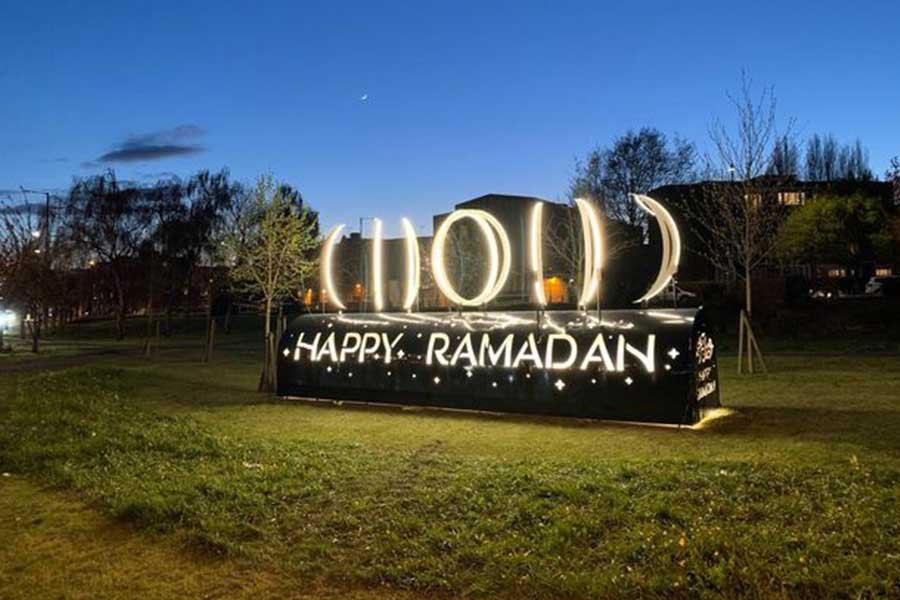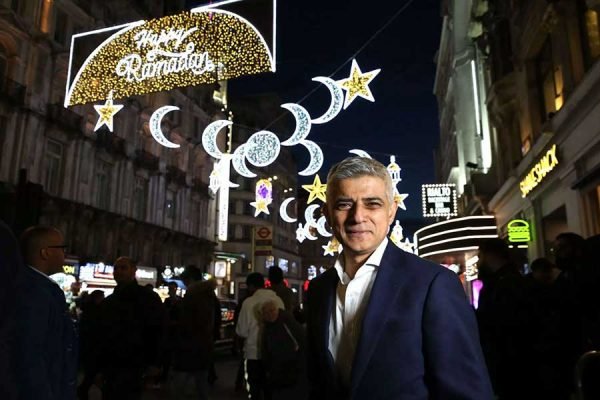
Everything you need to know about visiting London in Ramadan
Ramadan 2023 starts tonight (Wednesday March 22) with the first sighting of the crescent moon. The Islamic festival of fasting and prayer continues until the evening of Friday April 21. In London this year, though, there is a viable difference to the festival. For the first time, Ramadan will be celebrated with a light display in central London, in Piccadilly Circus, no less.
Mayor of London Sadiq Khan – whose election to the post in 2016 saw him the first Muslim to become mayor of a major Western capital city – is doing the big switch-on tonight. He said: ‘I’m delighted that London is the first major European city to host a spectacular light display to mark Ramadan. “Ramadan Lights” is a true symbol of how our capital celebrates our diversity.’
We’re used to Christmas in London seeing swathers of lights everywhere from Oxford Street to Kew Gardens. And, arguably, as the spring evenings lengthen, light displays become less and less spectacular. But maybe this glimmer of positivity is just what we need in the current gloom.
What is Ramadan?
Ramadan is the 9th month of the lunar calendar that lasts for either 29 or 30 days, depending on the next crescent sighting and is considered the holiest month in the Islamic calendar. It is a time of fasting, prayer, and reflection for Muslims around the world. Hence, the exact dates of Ramadan change every year. During this month, Muslims who are able to do so must fast from dawn until dusk, refraining from food and drink.
During Ramadan, Muslims abstain from food, drink, and other physical needs from dawn until sunset. This period of fasting is intended to help Muslims focus on their spiritual and moral development, as well as empathize with those who are less fortunate.
In addition to fasting, Muslims are encouraged to increase their charitable giving, attend mosque for daily prayers, and read and reflect on the Quran.
Overall, Ramadan is a time of spiritual renewal and a reminder of the importance of self-discipline, compassion, and devotion to Allah.

Iftar Ceremony
Iftar is the fast-breaking evening meal at sunset and is one of the most anticipated parts of the day during Ramadan. It is a time when family and friends come together to break their fast and enjoy a meal after a day of fasting. Iftar is not just about satisfying hunger, but it is also a time of celebration, reflection, and community.
Muslims traditionally break their fast with dates and either water or a yogurt drink. After that, they pause for the night (Maghrib) prayer. Following the prayer, a full-course meal is enjoyed, which typically includes a lavish spread of Arabic dishes like Harees a delectable blend of mashed wheat often cooked with meat or chicken, Kibbeh, a savory mix of bulgur wheat and finely minced lamb, traditional Harira soup, and the all-time favorite Fattoush salad.
Tips for visiting London during Ramadan
Ramadan is an important month in the Islamic calendar, and London has a large and diverse Muslim population. As a result, there are many things to see and do in London during Ramadan. Here are some tips for visiting London during Ramadan:
1. Understand the basics of Ramadan:
Ramadan is a month-long period of fasting, prayer, and reflection for Muslims. During this time, Muslims fast from sunrise to sunset, and break their fast with an evening meal called iftar. It is important to be respectful of those who are fasting during this time, and to understand that many restaurants and cafes may be closed during the day.
2. Plan ahead:
If you are visiting London during Ramadan, it is important to plan ahead. Many restaurants and cafes will be closed during the day, so it is important to find out which ones are open before you go out. It is also a good idea to plan your itinerary around the times of day when Muslims will be breaking their fast, as these times can be busy and chaotic.
3. Attend a Ramadan event:
London is home to many events and activities during Ramadan. You can attend a mosque open day, where you can learn about Islam and the customs of Ramadan, or visit a night market or festival, where you can sample traditional foods and enjoy live music and entertainment.
4. Be respectful:
During Ramadan, it is important to be respectful of those who are fasting. This means refraining from eating, drinking, or smoking in public during the day. It is also important to dress modestly and to be mindful of your behavior in public.
5. Visit Islamic landmarks:
London is home to several Islamic landmarks that are worth visiting during Ramadan. These include the East London Mosque, which hosts daily iftars during Ramadan, and the Islamic Centre of England, which offers a range of events and activities during the month.
6. Eid al-Fitr in London
Ramadan ends with the celebration of Eid al-Fitr, a festival of breaking the fast. Muslims gather with family and friends, exchange gifts, and partake in special meals to mark the end of the month of Ramadan. Visitors can enjoy a host of exciting events, live entertainment, and fantastic discounts during this public holiday, making it a lively and vibrant time to be in London.
Bonus tip
In summary, visiting London during Ramadan can be a unique and rewarding experience. By planning ahead, attending events, and being respectful of those who are fasting, you can make the most of your time in this diverse and vibrant city.
Navigating the city can be challenging, especially if you are unfamiliar with the area in Ramadan. Which is why we advise that you book a hourly car rental service in London to get you to your destination in style. When you browse the London Airport Transfers website, you’ll get access to local chauffeurs who know the best route to take. We can also help you navigate some of the cultural and even infrastructural differences you’ll face on arrival.

